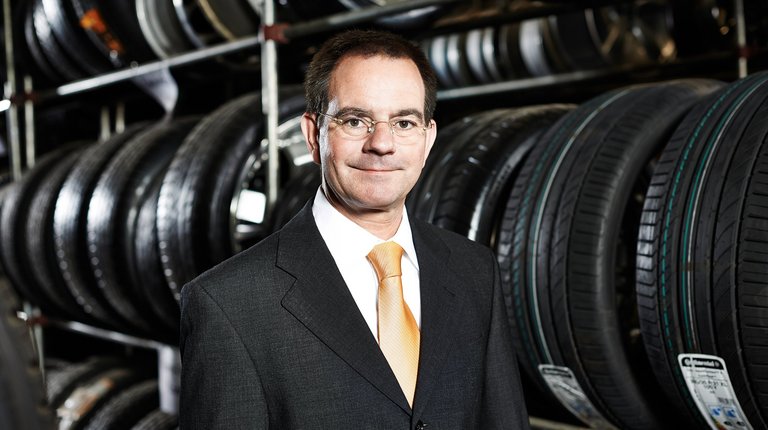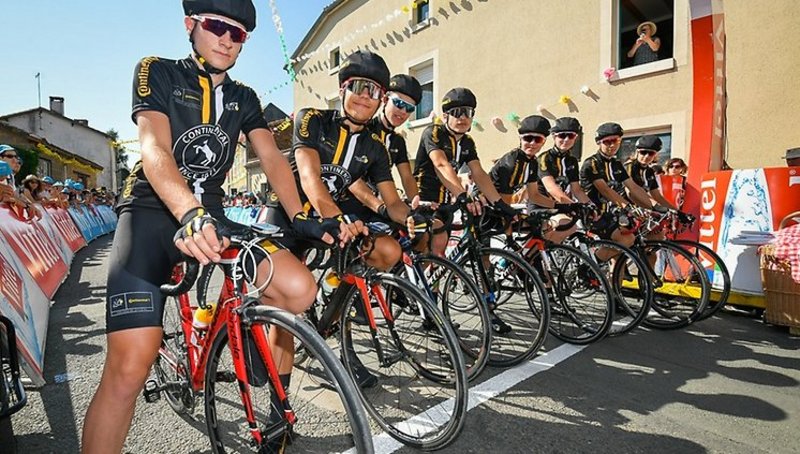The World’s Toughest Bike Race Kicks Off in Brussels
- Six WorldTour teams put their trust in top technology from Continental
- Continental racing tires feature BlackChili Compound
- The Tour de France: 3,640 kilometers, two time trials, five summit finishes
Hanover, July 2019. With its daring attacks, solo breakaways, spectacular bunch sprints in the valleys and breathtaking summit finishes in the Alps and Pyrenees, when the Tour de France gets underway this coming weekend, the world’s toughest bike race is sure to corner the sporting headlines across the media. And once again the Tour will provide a prominent platform for Continental’s top technology in the two-wheeler segment. In the battle for the yellow jersey, the quality of the tires will be a key factor in deciding stage wins and podium finishes. Choosing the right tires has long since become as important in the Tour de France as it is in Formula 1. Which is why many of the top teams put their faith in the technological expertise of Continental’s development engineers – including the team of last year’s overall winner, Geraint Thomas from Wales.
Top technology from Korbach in Germany
In all, seven teams will be contesting this year’s race on Competition Pro LTD tires from Continental. This high-tech racing tire was developed at the Continental tire plant in Korbach, Germany, where it is also handmade. The special tires for the Tour tip the scales at only 250 grams. In contrast to conventional ‘clincher’ bike tires, these are tubular tires or ‘tubs’ with a fine-ribbed tread. Compound, comfort, long stages, demanding route. And there’s a core advantage that derives from the tire design: As the tubular tires are glued to the rim, they cannot come off in the event of a puncture. The most striking feature is an extremely slender contact patch for optimum rolling resistance. This transfers the steering commands and braking forces safely and reliably to the road even at 100 km/h on steep descents. Developments in tire technology have also played a key part in enabling average speeds to rise from 25 km/h in the world’s first ever stage race to the current level of 40 km/h, despite the routes becoming more and more challenging.
Just like in the SportContact 6: The tires for the Tour feature BlackChili technology
Like all Continental car and two-wheeler tires, the high-performance bike tires for the Tour benefit from the company’s innovative BlackChili rubber technology. Originally developed for bicycle tires, today the BlackChili compound is also used in car tires such as the SportContact 6 for high-performance sports cars and is constantly being refined and enhanced. The performance of the rubber compound in a tire is determined by three requirements, each of which impacts on the others: grip, rolling resistance and mileage. And here’s the developers’ dilemma: If they improve one of these factors, they automatically detract from at least one of the others. The experts talk in terms of trade-offs here. In its BlackChili compound, a tread strip compound invariably based on the latest polymer and raw materials research findings, Continental has succeeded in resolving these conflicting interests once and for all. In the BlackChili compound, the recipe is fine-tuned to the application of each specific tire. Special synthetic rubbers are combined with natural rubber to create particularly high-performance tread compounds, then soot particles optimized in terms of shape and surface properties are added.
The Tour de France: 3,460 km across Belgium and France
The world’s toughest bike race gets underway in Brussels on July 6 and finishes as always in Paris, 21 stages later. This year, the riders will cover 3,460 kilometers. Along with the individual and team time trials, each over 27 kilometers, the highlights will again include a succession of ultra-demanding mountain stages. When the riders enter the Pyrenees they will be facing no fewer than five mountain stages in a single week, three with summit finishes at over 2,200 meters. But the experts expect the ultimate winner in the general classification (GC) to be decided in the Alps. Here, in the last two days before the Tour rolls into Paris, two more arduous summit finishes lie in wait – the first in Tignes (2,113 meters) and the second in Val Thorens (2,365 meters). This year for the first time Continental is one of five Main Partners to the Tour de France, which means that the company will enjoy greater visibility, not least when the winners of each stage are presented with their trophies.

Klaus Engelhart
Press Spokesman
Passenger Car Tires / Germany, Austria, Switzerland
- +49 511 938-2455





